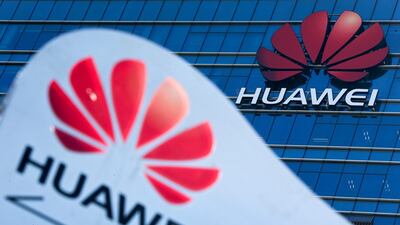Huawei has stockpiled enough chips and other vital components to keep its business running for at least three months as the US curtails its access to American technology, people familiar with the matter said.
The Trump administration on Friday blacklisted China’s largest tech company -- which it accuses of aiding Beijing in espionage -- threatening to cut off the American software and semiconductors it needs to make smartphones and networking gear. But it’s been preparing for such an eventuality since at least the middle of 2018, hoarding components while designing its own chips, the people said.
Government officials also privately warned Huawei executives last year to explore non-American alternatives, the people said, asking not to be identified talking about internal affairs. The three-month cushion is a conservative internal estimate and the company could well sustain operations beyond that time-frame, they said.
The moves against China’s national champion may have devastating consequences for the rest of the world. Blocking the sale to Huawei of critical components such as semiconductors could cripple its operation, depress the businesses of American chip giants from Qualcomm to Micron Technology and retard the rollout of critical 5G wireless networks worldwide.
“The impact on Huawei will be extremely significant. An obvious impact is on the supply chain, but there is another layer of impact on confidence and its overall business,” said Cui Kai, a telecom analyst with consultancy IDC. “It will also have a negative impact on the 5G technology evolution around the world.”
Ken Hu, Huawei’s deputy chairman, responded to the US decision in a memo to employees.
"This decision is the latest move in the campaign against Huawei, waged by the US government for political reasons,” he wrote. “The company has known this could be a possibility for many years. We have invested heavily and made full preparations in a variety of areas, including R&D and business continuity, which will ensure that our business operations will not be greatly affected, even under extreme conditions.
That US maneuver coincides with sensitive trade negotiations between Washington and Beijing. Huawei executives reckon their company has become a bargaining chip and they will be able to resume buying from American suppliers if a trade deal is reached, the people said. That’s why they calculate a three-month stockpile may be enough to tide them over.
If Huawei’s calculation is wrong, the consequences would be dire. If the ban isn’t resolved along with the trade dispute, the company would be severely handicapped in its ability to provide advanced wireless networks. Much of its carrier and smartphone businesses -- the two pillars of the company -- would be at risk.
An outright ban on Huawei elevates fears in Beijing that President Donald Trump’s broader goal is to hamstring China, igniting a protracted cold war between the world’s biggest economies. In addition to a trade fight that has rattled global markets for months, the US is pressuring allies and foes alike to avoid using Huawei in the 5G networks that will form the backbone of the modern economy.
At the heart of Trump’s concerted campaign is suspicion that Huawei aids Beijing in espionage while spearheading China’s ambitions to become a technology superpower. The Justice Department also accuses it of willfully violating sanctions on Iran, and last year engineered the arrest of the eldest daughter of Huawei’s billionaire founder. Huawei has repeatedly denied the allegations.
In the longer term, Huawei still has to assure its customers -- many of the world’s largest telecommunications carriers -- that it can not just build, but also maintain, their wireless networks. The US ban hits the Chinese company just as it’s jockeying for a big chunk of the hundreds of billions of dollars that the likes of Vodafone Group and China Mobile are devising around the world, laying the foundation for future technologies from autonomous cars to smart cities.
Huawei’s predicament underscores the extent to which China as a whole is reliant on foreign chip technology: the country imports more semiconductors today than oil. While Huawei and peers such as Tsinghua Unigroup are designing increasingly advanced architectures, they haven’t reached sufficient scale in production to make a dent in that annual inflow.
Still, Huawei has had business-continuity plans in place for years. Teresa He, president of Huawei chip-making unit HiSilicon, called the US ban “crazy” and “groundless” in a letter sent to employees and seen by Bloomberg. While HiSilicon was seen as a backup plan for Huawei’s semiconductor needs, the ban will make it a primary supplier, she said in her letter.

